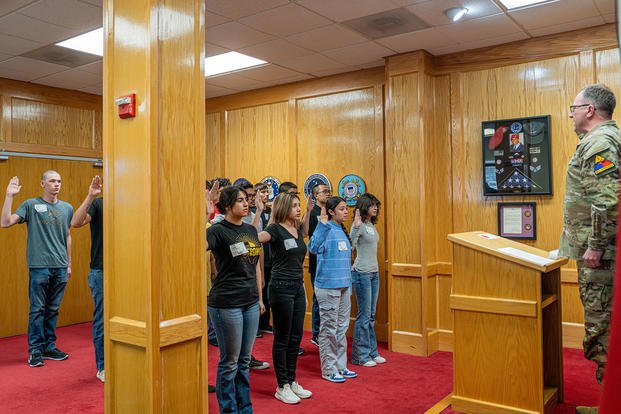Female Teens Don't See Themselves in the US Military. Here's Why, According to Pentagon Surveys.

New polling data from the Pentagon finds that 60% of young female adults in the U.S. have never considered joining the military or pictured themselves in uniform, largely for reasons that could be addressed by targeted recruiting[1] and educational outreach, a Defense Department official said Tuesday.
An update on the female military recruiting market[2] presented to the Defense Advisory Committee on Women in the Services found that most young women in America don't know anything about the U.S. military, and what they know comes largely from television or popular media.
Given these sources, they believe that if they join a service, they will spend four years not being able to express opinions or make decisions, and when they return to civilian life, they will have readjustment issues, according to Jeremy Hall, director of the DoD's Joint Advertising Market Research and Studies.
Read Next: Army Secretary Fires 4-Star General Who Meddled in Promotion of Unfit Subordinate[3]
"They think four years in the military genuinely is a boot camp video that they can see on YouTube," Hall said. "This is really steeped in popular media, in what they see and how service and service members are portrayed -- that noble yet damaged warrior haunted by their military experience because the military does not have a presence in many communities."
These attitudes have significant implications for the armed services, which have struggled in the past several years to recruit members. While the services met their accession goals in fiscal 2024, they still face challenges getting qualified members. Just one-quarter of American young people meet eligibility requirements -- 25% of young men and 21% of young women, according to the data provided to DACOWITS.
The top reasons young women aren't eligible to join are, in order: physical or medical conditions; weight; and mental health disorders. The three reasons, also in order, that young American men don't qualify are: drug abuse; weight; and physical or medical conditions.
According to the polling, the overall interest in joining the military among American youth has dropped from an average 13% from 2012 to 2019 to 10% in the last five years.
The data shows that American teenage girls tend to have higher grades in high school, with 74% of those surveyed earning mostly As and Bs compared with boys at 60%, and have higher educational goals than their male counterparts, with 47% wanting to earn a master's, doctoral or professional degree compared with males at 33%.
With those aspirations, Hall said, many see military service as an unnecessary delay or incompatible with achieving their goals.
The top reasons given by potential male and female recruits for not joining the military were the possibilities of physical injury or death, developing psychological issues, and leaving family and friends.
Women expressed concerns about sexual assault and harassment as a primary reason for not wanting to join; 53% said it was a concern, compared with 11% of men.
Many women polled also expressed low confidence in their ability to succeed.
"Only about a quarter of youth think they'd probably be successful," Hall said.
Young women said, however, that the top reasons they would join the military would be for pay[4] and to cover education costs. Young men said their top reasons were for pay and health care.
With those thoughts in mind, Hall said, there are opportunities to again market the military as a place to meet people, travel, gain experience and earn GI Bill[5] benefits.
"I can take advantage of paying for it, my education. I can get work skills and experiences. I can get good experiences. I can have camaraderie. These are all factors that they see as benefits of military service," Hall said.
Concerns have risen among women service members in the past month over their futures, given remarks made by Army National Guard[6] veteran and former Fox News host Pete Hegseth, President-elect Donald Trump's nominee for secretary of defense.
On the Shawn Ryan Show podcast Nov. 7[7], Hegseth said "straight up ... we shouldn't have women in combat roles. It hasn't made us more effective; it hasn't made us more lethal, it has made fighting more complicated."
But Hegseth walked back those statements Monday during an appearance on Fox News[8] as he lobbies for Senate confirmation.
"Some of our greatest warriors, our best warriors out there, are women who served, raised their right hand to serve this country and love our nation and want to defend that flag, and they do it every single day around the globe," Hegseth said.
Hall said the Defense Department is using his office's information, which is drawn from focus groups with youth ages 16 to 21 and "influencers," including parents and other family members, educators and coaches, to craft outreach programs, public service ads and education.
He said he'd like to see the Reserve and National Guard components reach out in their communities to educate local youth about the concept of part-time service, which he added that high schoolers simply don't comprehend.
And he'd like recruiters to be given the time to engage with local residents -- at community events, football games, parades -- especially in locations that don't have a large community presence.
Recruiters, he said, face immense pressure in the current environment to make quotas and have little time simply to be available.
"I think more physical presence in the community is how we start to drastically reverse these trends," Hall said.
Related: Prep Courses, Policy Tweaks Largely Drove the Military's Recruiting Success in 2024[9]
© Copyright 2024 Military.com. All rights reserved. This article may not be republished, rebroadcast, rewritten or otherwise distributed without written permission. To reprint or license this article or any content from Military.com, please submit your request here[10].


 Every December, millions of families around the world track Santa's Yuletide journey through the North American Aerospace Defense Command's Santa Tracker. "NORAD Tracks Santa" is a holiday tradition that started from humble origins — and as a fluke — but
Every December, millions of families around the world track Santa's Yuletide journey through the North American Aerospace Defense Command's Santa Tracker. "NORAD Tracks Santa" is a holiday tradition that started from humble origins — and as a fluke — but